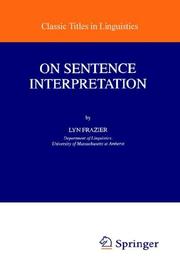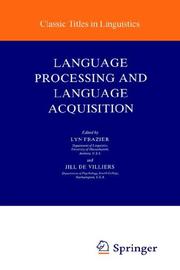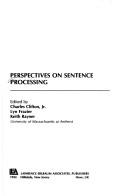| Listing 1 - 10 of 17 | << page >> |
Sort by
|

ISBN: 9780792356028 0792355083 0792356020 9401145997 Year: 2008 Publisher: Place of publication unknown Springer
Abstract | Keywords | Export | Availability | Bookmark
 Loading...
Loading...Choose an application
- Reference Manager
- EndNote
- RefWorks (Direct export to RefWorks)
At present there exists no empirically-motivated theory of how perceivers assign a grammatically-permissible interpretation to a sentence. Implicit in many investigations of language comprehension is the idea that each constituent of a sentence is interpreted by the perceiver at the earliest conceivable point, using all potentially relevant sources of information. A variety of counter examples are presented to argue against this implicit theory of sentence interpretation. It is argued that an explicit alternative theory is needed to specify which decisions are made at which points during interpretive processing and to spell out the principles governing the processor's preferred choice at points of ambiguity or uncertainty. Several specific issues are taken concerning how the processor assigns a focal structure to an input sentence, how it identifies the topic of the sentence, how implicit restrictors on the domain of quantification are interpreted and how the identification of the content of a restrictor may guide the processor's use of discourse information. Exploiting intuitions about preferred interpretations of ambiguous sentences as well as the results of both old and new experimental studies, a theory of the preferred interpretation of Determiner Phrases is presented. This work explores important, but overlooked questions in on-line sentence interpretation and attempts to erect some of the scaffolding for an eventual theory of sentence interpretation.
Lexicology. Semantics --- Sociolinguistics --- Grammar, Comparative and general --- Psycholinguistics. --- Experimentele psychologie --- Sentences. --- denken, begripsvorming en problem solving. --- Artificial intelligence. --- Syntax. --- Semantics. --- Artificial Intelligence. --- Formal semantics --- Semasiology --- Semiology (Semantics) --- Comparative linguistics --- Information theory --- Language and languages --- Lexicology --- Meaning (Psychology) --- AI (Artificial intelligence) --- Artificial thinking --- Electronic brains --- Intellectronics --- Intelligence, Artificial --- Intelligent machines --- Machine intelligence --- Thinking, Artificial --- Bionics --- Cognitive science --- Digital computer simulation --- Electronic data processing --- Logic machines --- Machine theory --- Self-organizing systems --- Simulation methods --- Fifth generation computers --- Neural computers --- Language, Psychology of --- Psychology of language --- Speech --- Linguistics --- Psychology --- Thought and thinking --- Psychological aspects --- Sentences (Grammar) --- Sentences
Book
Year: 1979 Publisher: Bloomington (Ind.) : Indiana University. Linguistics club,
Abstract | Keywords | Export | Availability | Bookmark
 Loading...
Loading...Choose an application
- Reference Manager
- EndNote
- RefWorks (Direct export to RefWorks)
Book
Year: 1979 Publisher: Bloomington Indiana University. Linguistics club
Abstract | Keywords | Export | Availability | Bookmark
 Loading...
Loading...Choose an application
- Reference Manager
- EndNote
- RefWorks (Direct export to RefWorks)

ISBN: 0262061791 Year: 1996 Publisher: Cambridge, Mass. MIT
Abstract | Keywords | Export | Availability | Bookmark
 Loading...
Loading...Choose an application
- Reference Manager
- EndNote
- RefWorks (Direct export to RefWorks)
Cognitive grammar --- Grammar, Comparative and general --- -Psycholinguistics --- Language, Psychology of --- Language and languages --- Psychology of language --- Speech --- Linguistics --- Psychology --- Thought and thinking --- Cognitive linguistics --- Psycholinguistics --- Comparative grammar --- Grammar --- Grammar, Philosophical --- Grammar, Universal --- Philosophical grammar --- Philology --- Sentences --- Psychological aspects --- Grammar, Comparative --- Cognitive grammar. --- Psycholinguistics. --- Experimentele psychologie --- Sentences. --- psycholinguistiek. --- Grammaire cognitive --- Phrase (Linguistique) --- Psycholinguistique --- Sentences (Grammar) --- Psycholinguistiek.
Book
ISBN: 9783319129617 3319129600 9783319129600 3319129619 Year: 2015 Publisher: Cham : Springer International Publishing : Imprint: Springer,
Abstract | Keywords | Export | Availability | Bookmark
 Loading...
Loading...Choose an application
- Reference Manager
- EndNote
- RefWorks (Direct export to RefWorks)
Top researchers in prosody and psycholinguistics present their research and their views on the role of prosody in processing speech and also its role in reading. The volume characterizes the state of the art in an important area of psycholinguistics. How are general constraints on prosody (‘timing’) and intonation (‘melody’) used to constrain the parsing and interpretation of spoken language? How are they used to assign a default prosody/intonation in silent reading, and more generally what is the role of phonology in reading? Prosody and intonation interact with phonology, syntax, semantics and pragmatics and thus are at the very core of language processes.
Linguistics. --- Psycholinguistics. --- Semantics. --- Syntax. --- Grammar, Comparative and general --- Linguistique --- Psycholinguistique --- Sémantique --- Syntaxe --- Grammar, Comparative and general. --- Language acquisition. --- Prosodic analysis (Linguistics). --- Social Sciences --- Languages & Literatures --- Psychology --- Philology & Linguistics --- Prosodic analysis (Linguistics) --- Multidimensional phonology --- Polysystemic phonology --- Prosodic phonology --- Speaking styles --- Language, Psychology of --- Language and languages --- Psychology of language --- Speech --- Psychological aspects --- Linguistics --- Thought and thinking --- Phonetics --- Phonology --- Comparative grammar --- Grammar --- Grammar, Philosophical --- Grammar, Universal --- Philosophical grammar --- Philology --- Formal semantics --- Semasiology --- Semiology (Semantics) --- Comparative linguistics --- Information theory --- Lexicology --- Meaning (Psychology) --- Grammar, Comparative --- Grammar, Comparative and general Syntax --- Syntax
Book
ISBN: 0262273128 0585341176 9780585341170 Year: 1996 Publisher: Cambridge, Mass. : MIT Press,
Abstract | Keywords | Export | Availability | Bookmark
 Loading...
Loading...Choose an application
- Reference Manager
- EndNote
- RefWorks (Direct export to RefWorks)
Cognitive grammar. --- Grammar, Comparative and general --- Psycholinguistics. --- Cognitive grammar --- Psycholinguistics --- Languages & Literatures --- Philology & Linguistics --- Language, Psychology of --- Language and languages --- Psychology of language --- Speech --- Linguistics --- Psychology --- Thought and thinking --- Comparative grammar --- Grammar --- Grammar, Philosophical --- Grammar, Universal --- Philosophical grammar --- Philology --- Cognitive linguistics --- Sentences (Grammar) --- Sentences. --- Sentences --- Psychological aspects --- Grammar, Comparative
Digital
ISBN: 9783319129617 9783319129624 9783319129600 9783319354033 Year: 2015 Publisher: Cham Springer International Publishing
Abstract | Keywords | Export | Availability | Bookmark
 Loading...
Loading...Choose an application
- Reference Manager
- EndNote
- RefWorks (Direct export to RefWorks)
Top researchers in prosody and psycholinguistics present their research and their views on the role of prosody in processing speech and also its role in reading. The volume characterizes the state of the art in an important area of psycholinguistics. How are general constraints on prosody (‘timing’) and intonation (‘melody’) used to constrain the parsing and interpretation of spoken language? How are they used to assign a default prosody/intonation in silent reading, and more generally what is the role of phonology in reading? Prosody and intonation interact with phonology, syntax, semantics and pragmatics and thus are at the very core of language processes.
Lexicology. Semantics --- Psycholinguistics --- Linguistics --- semantiek --- syntaxis --- psycholinguïstiek

ISBN: 0792306600 0792306597 9401138087 Year: 1990 Publisher: Dordrecht Boston London Kluwer
Abstract | Keywords | Export | Availability | Bookmark
 Loading...
Loading...Choose an application
- Reference Manager
- EndNote
- RefWorks (Direct export to RefWorks)

ISBN: 0805815821 Year: 1994 Publisher: Hillsdale, N. J. L. Erlbaum Associates
Abstract | Keywords | Export | Availability | Bookmark
 Loading...
Loading...Choose an application
- Reference Manager
- EndNote
- RefWorks (Direct export to RefWorks)
Book

ISBN: 1282188038 9786612188039 3110216159 9783110216158 3110213478 9781282188037 6612188030 Year: 2009 Publisher: Berlin Boston
Abstract | Keywords | Export | Availability | Bookmark
 Loading...
Loading...Choose an application
- Reference Manager
- EndNote
- RefWorks (Direct export to RefWorks)
The second volume of the two-volume set The Fruits of Empirical Linguistics focuses on the linguistic outcomes of empirical linguistics. The contributions present some of the insights that linguists can gain by applying the new methods: progress within language study is accelerated by the new evidence since language systems are more precisely captured. Readers will enjoy the fresh perspective on linguistic questions made possible by the evidence-based approach.
Computational linguistics --- Discourse analysis --- Methodology. --- Data processing. --- Empirical Linguistics.
| Listing 1 - 10 of 17 | << page >> |
Sort by
|

 Search
Search Feedback
Feedback About UniCat
About UniCat  Help
Help News
News